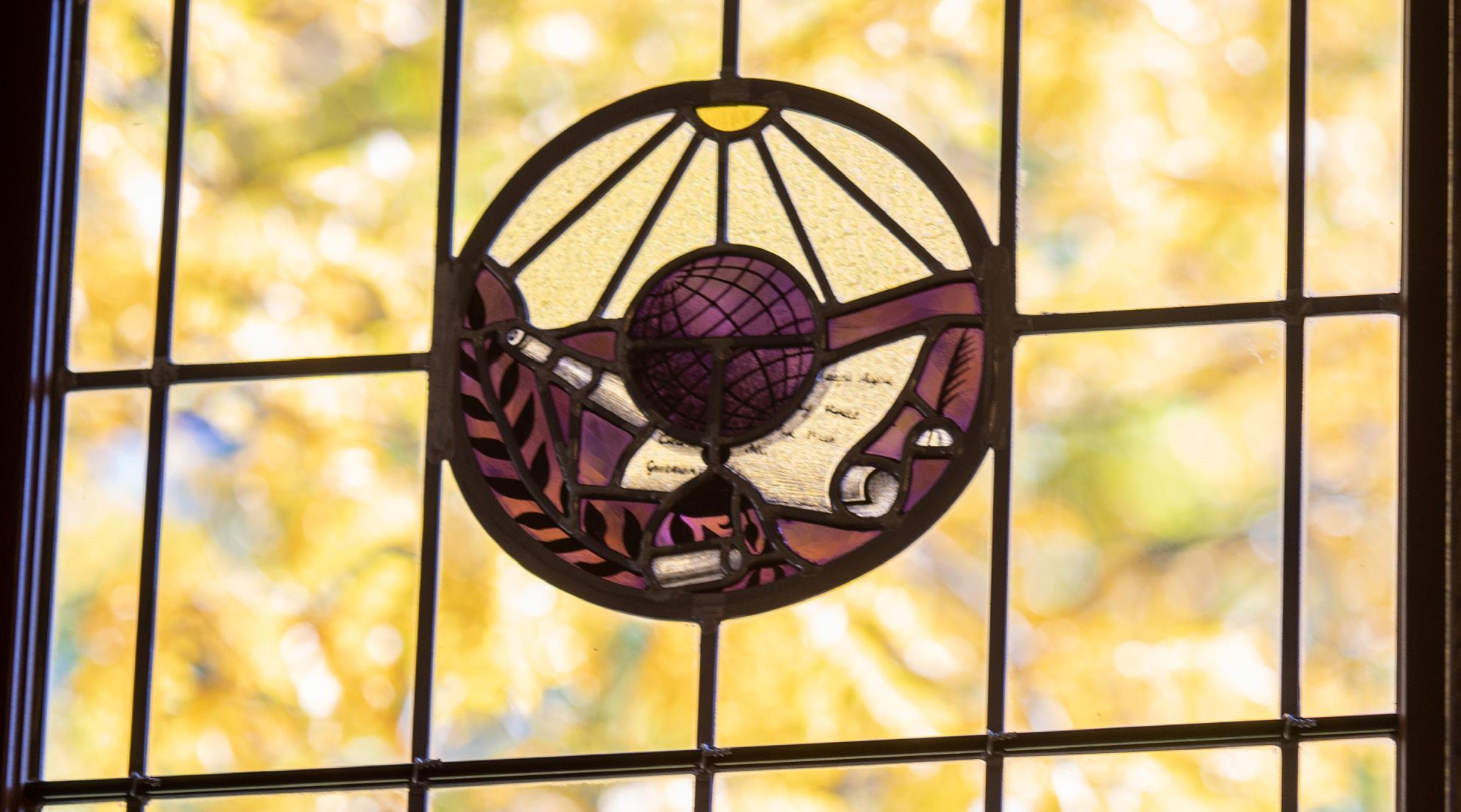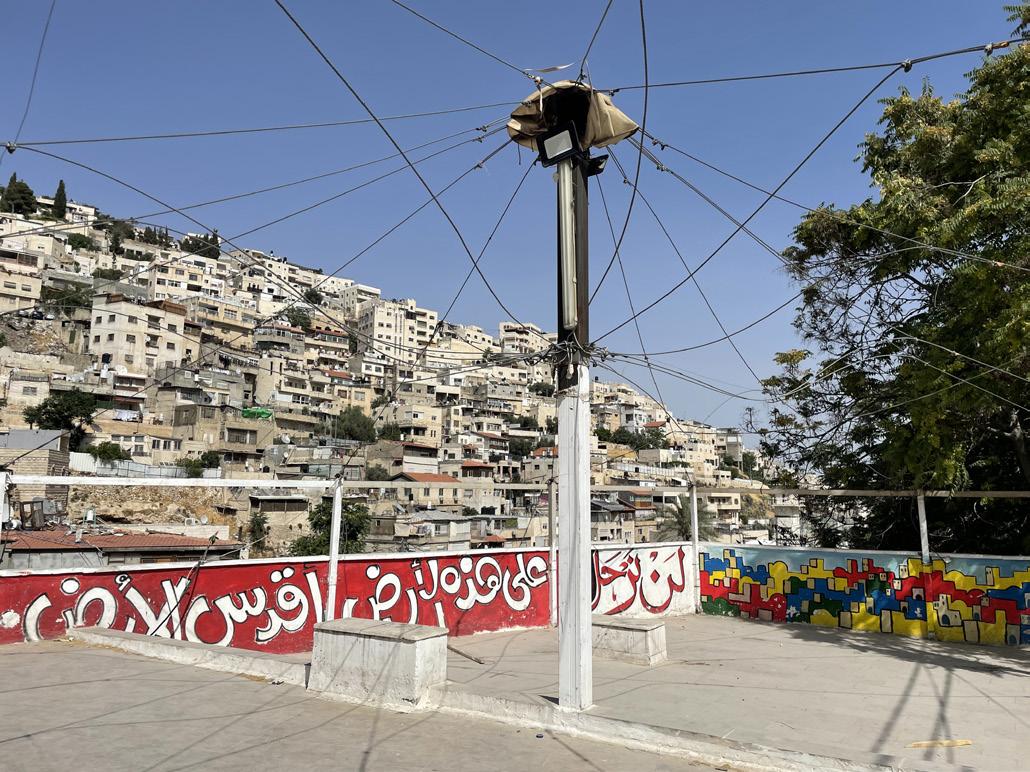
7 minute read
RELIGION, CONFLICT, AND PEACE INITIATIVE
The Religion, Conflict, and Peace Initiative (RCPI) has advanced ways of engaging diverse audiences inside and outside of the academy by developing imaginative paradigms for fostering just-peacebuilding in Israel/Palestine and beyond.

Advertisement
This year RCPI had three focuses: 1) expanding and solidifying Harvard academic and programmatic offerings to foster cross-disciplinary engagements; 2) continuing to build networks among scholars and practitioners around issues of peace and justice; and 3) developing a framework for considering future case studies.
Expanding Harvard Academic and Programmatic Offerings
During the past year, RCPI supported and developed academic offerings with Harvard’s graduate schools by integrating the discussions at the initiative into classes, fellowships, study programs, events, and internships.

RCPI transformed the traditional J-Term course “Learning in Context: Narratives of Displacement and Belonging in Israel/Palestine” into a semester-long interdisciplinary course open to all Harvard graduate students, followed by an experiential learning component on the ground in Israel/Palestine in June. This year, the course had 17 students enrolled from six Harvard schools—the Divinity School, Kennedy School (HKS), Faculty of Arts and Sciences (FAS), School of Education, School of Design, and Law School. The learning-in-context component consisted of more than 40 tours, visits, and meetings with organizations and individuals in Israel and the West Bank. Seven students decided to complete a twomonth summer internship available to those who participate in the “Learning in Context” course. Internship locations will include local human rights and legal centers, arts and cultural centers, a refugee camp community center, and larger regional and global organizations such as Churches for Middle East Peace and the YWCA.
Professors Raef Zreik, Atalia Omer, and Diane L. Moore co-taught the interdisciplinary course “Religion, Nationalism and Settler Colonialism: The Case Study of Israel/Palestine,” which examined the conceptual logic of using a settler-colonial lens to interpret the history and politics of Israel/Palestine. The course attracted students from HDS, HKS, FAS, Tufts University, and the Advanced Leadership Initiative (ALI) fellowship at Harvard.
For the second year in a row, RCPI facilitated a reading group titled “Decolonizing the Syllabus on Palestine/Israel: What Does Religion Have to Do With It?” We met for six 90-minute sessions during the fall semester and had 23 participants, including RCPI faculty affiliates and other Harvard faculty from the Graduate School of Arts and Sciences, Law School, Medical School, School of Design, and Divinity School, faculty from UMass Amherst and Dartmouth College, and alumni of RCPI’s “Narratives of Displacement and Belonging in Israel/Palestine” course. The reading group enhanced our crossdisciplinary learning and broadened our networks within and outside of Harvard University.
RCPI participated in a panel at the American Academy of Religion in November 2022. In addition, the nine public events RCPI held this year focused on three primary themes: protest, nationhood and democracy, and solidarity.



PROTEST: “The Embodiment of Protest: Hunger Strikes, Human Rights, and the Health of Palestinian Political Prisoners” explored various legal, medical, and human rights dimensions of hunger strikes being staged by Palestinian political prisoners. In a book talk with Amahl A. Bishara, on her Crossing a Line: Laws, Violence and Roadblocks to Political Expression, she analyzed how Palestinians create collectivities in circumstances of constraint, illuminating how expression is always grounded in place and how a people can struggle together for liberation even when they cannot join together in protest. Panelists at the event “An Extreme Religious Right Is in Control: Implications for Israeli Anti-Occupation Activism and the Mizrahi Left” interrogated the relations between the Israeli mass protest against diminishing judicial independence and decades of occupation by contextualizing the emergence of an extremist right-wing religious and settler (annexationist) agenda in the recent Israeli elections.
NATIONHOOD AND DEMOCRACY: Panelists in “Another Israeli Election: Assessing Trends in Israeli and Jewish Politics” examined the gradual strengthening of Jewish exclusionary political parties, the influences of Jewish and Christian American agendas on Israeli political trends, and the historical and philosophical meanings of Jewish political modernity. In the book talk on Rethinking Statehood in Palestine: Self-Determination and Decolonization beyond Partition, edited by Leila H. Farsakh, discussion centered on how notions of citizenship, sovereignty, and nationhood are being rethought within the broader context of decolonization. Participants in the event “The Palestinian Question as a Jewish Question” interrogated how questions of war and peace, borders, security, or the “two state” solution become more and more internal to Israel, relating intimately with questions of the identity of the state, its character, and its constitutional structure and democratic nature.
SOLIDARITY: Discussants in the book talk on Light in Gaza: Writings Born of Fire imagined the future of Gaza beyond the cruelties of daily life, while reaffirming the critical role of Gaza in Palestinian identity, history, and struggle for liberation. Participants in “Transnational Solidarity, Israel/Palestine, and Intellectual Legacies of Desmond Tutu” discussed Tutu’s thought on apartheid in Israel/Palestine, as well as broader transnational solidarity. The event “Displacement and Belonging in Israel/Palestine: Harvard Student Stories of Learning in Context” gave space for students from the 2022 “Learning in Context” cohort to share their experiences of joy, resistance, and solidarity from their summer in Israel/Palestine.
Building Networks and Community at Harvard and Beyond
This year, we continued to build a community of scholars and practitioners that can carry the RCPI experience to broad and diverse audiences as they engage creatively and dynamically with topics related to religion, conflict, and peace.

Our growing community of RCPI affiliates has resulted in exciting collaborations. This year, we worked with Salma Waheedi of the International Human Rights Clinic at Harvard Law School to amplify the work the clinic is doing on Israel/Palestine, some of it groundbreaking for Harvard. We are now planning a joint program for the upcoming academic year. We also collaborated with Bram Wispelwey and David Mills in the launch of the Palestine Program for Health and Human Rights at the FXB Center for Health and Human Rights and in planning their first course offering on the ground at Birzeit University in the West Bank in July 2023. We continued to work closely with Sara Roy from the Center for Middle Eastern Studies and engaged new faculty members across the University for possible affiliation and in preparation for a new Professional and Lifelong Learning (PLL) course in Israel/Palestine, which we plan to offer in the upcoming academic year.
Professor Raef Zreik joined RCPI as the Religion and Public Life Visiting Scholar in Conflict and Peace for the spring semester. Zreik actively contributed to the community throughout the semester, co-teaching the course “Religion, Nationalism, and Settler Colonialism: The Case of Israel/Palestine”; meeting with students; and joining in events as a speaker, respondent, or moderator. He also took part in a Julis Rabinowitz Program on Jewish and Israeli Law event, “Constitutional Crisis in Israel? Noah Feldman and Raef Zreik in Conversation,” at Harvard Law School.
RCPI alumnx continue to engage and connect with us in ways that enrich the experience of our community members. For example, Shir Lovett-Graff, MTS ’23, and Kevin Keystone, MTS ’23, launched the Harvard student group Jews for Liberation. Kathryn (Katie) Lorber Falk, FAS ’21, who returned to Israel/Palestine to volunteer in the Southern Hebron Hills with Heneinu and the Center for Jewish Nonviolence, joined our J-Term group when we visited the Southern Hebron Hills and shared her experiences and work with the students. Other alumnx from prior cohorts met with new students during program dinners during the fall and spring semesters. Ten RCPI alumnx also joined our fall reading group.

May 2023 marked the 75th anniversary of what Palestinians call the Nakba, or catastrophe: the founding of the modern state of Israel and the accompanying mass displacement and violence experienced by Palestinians. Hilary Rantisi, associate director of the Religion, Conflict, and Peace Initiative, spoke at First Church in Cambridge, Congregational, UCC, at a commemoratory event, sharing her family’s experience of the Nakba and offering an update on the current challenge to and opportunities for advancing just peace in Israel and the Occupied Palestinian Territories.
Developing a Framework for RCPI Future Case Studies
In keeping with commitments made in the RPL strategic plan, this year we determined a process for adding more casestudy locations to the program in addition to our study of Israel/Palestine. The approach includes three components that form the academic foundation for any new case study and learning: content, praxis, and implementation. In addition, the approach requires skilled personnel at RPL with in-depth understanding and knowledge of regional context from both academic study of and field experience in the case-study location. In addition to their knowledge of and connections to people and institutions of meaning, they need to have a background in the academic discussions covered in the program and the capacity to convert their contacts into engaging relationships with the students and faculty.
RCPI Internship Sites, Summer 2023
• BADIL Resource Center for Palestinian Residency and Refugee Rights (Bethlehem, West Bank, Occupied Palestinian Territories)
• Churches for Middle East Peace (Bethlehem, West Bank, Occupied Palestinian Territories)
• Human Rights Center (Ramallah, Occupied Palestinian Territories)
• Lajee Center (Aida Refugee Camp, Bethlehem, West Bank, Occupied Palestinian Territories)
• Qattan Foundation (Ramallah, Occupied Palestinian Territories)
SHIR LOVETT-GRAFF, MTS ’23
I was drawn to RCPI because I wanted to deepen my historical, religious, and political knowledge of IsraelPalestine in a non-Jewish learning space. Growing up in liberal Zionist Jewish communities and then becoming an anti-Zionist activist in my early 20s, I knew that many narratives had been purposely hidden from me to feed a particular political agenda. I could not have anticipated that HDS would offer me a space to learn about decolonization, nonviolent resistance, and censorship in relation to Israel/Palestine through RCPI.

Our experiential learning trip was a formative, painful, and powerful experience that shaped my on-the-ground understanding of political realities in Israel/Palestine. Our conversations with leaders at Palestinian arts and culture organizations helped me realize the way that Israeli apartheid intends to destroy everything—from after-school art programs to independent film festivals— despite claims by liberal Zionists to the contrary. It makes me, as a community organizer and a writer, consider how threatening art, public storytelling, and cultural preservation are to oppressive systems, and what it looks like to build solidarity through art and culture.
I know that my long-term community work will be to grow Jewish communities decoupled from Zionism, either as a rabbi, chaplain, or ritualist. I want to provide spiritual counseling and support to individuals engaged in the terrifying work of building new political and spiritual identities beyond what they have been taught. I am also interested in supporting organizations and individuals in thinking expansively about conflict, mediation, and restorative justice, especially within grassroots organizations, carceral spaces, and NGOs. Without my experiences through RCPI, I could not have named that the work I feel most passionately about lies at the intersection of conflict transformation and spiritual care, both in relation to Israel/Palestine and beyond.
Listen to Shir Lovett-Graff’s Memorial Church Morning Prayers sermon on radical imagination, gender, and political dreaming on Harvard Memorial Church’s channel on soundcloud.com.










